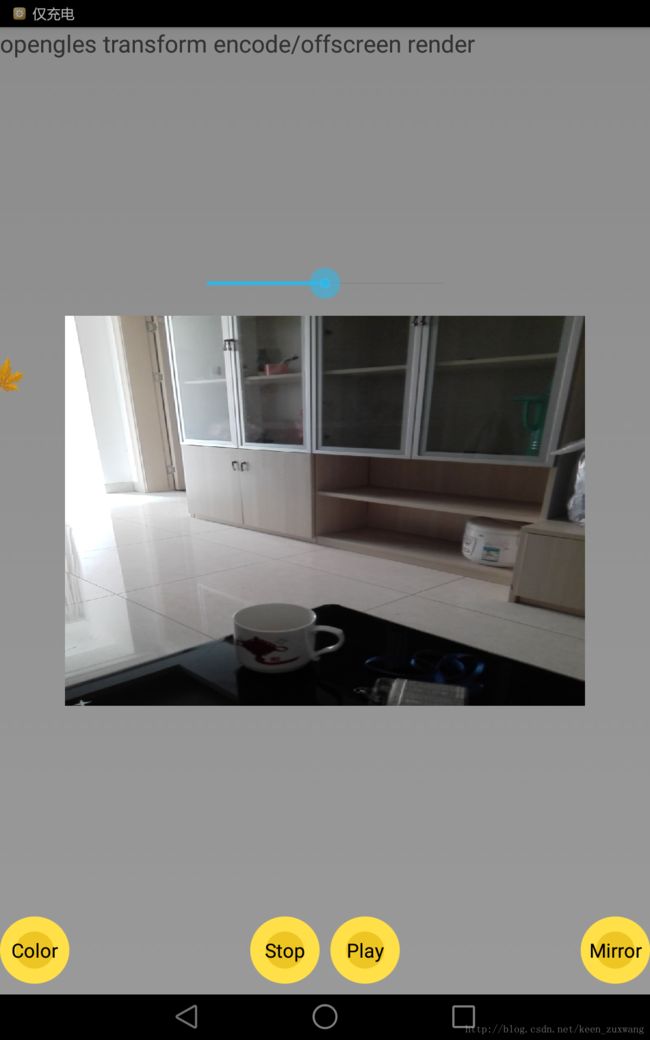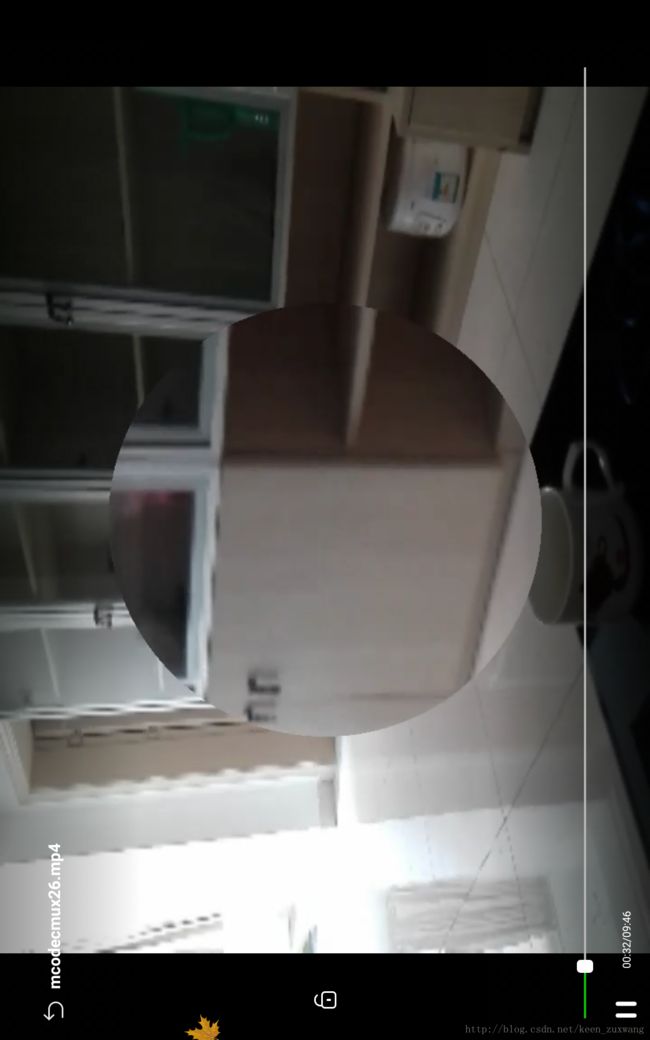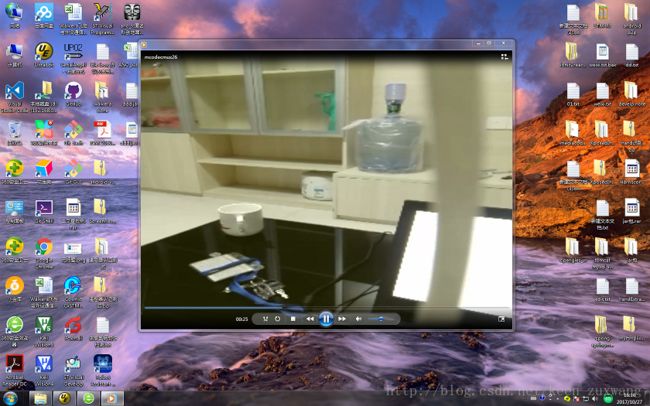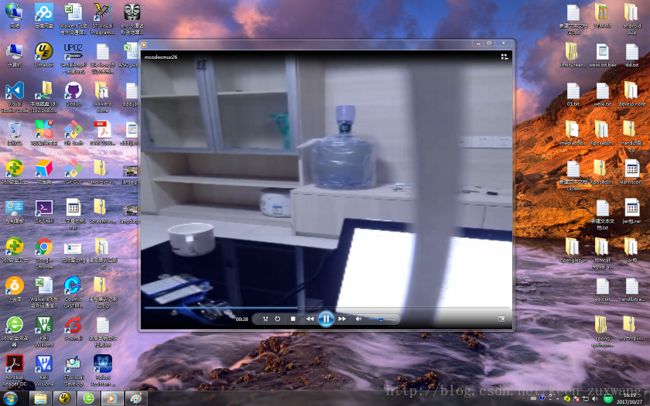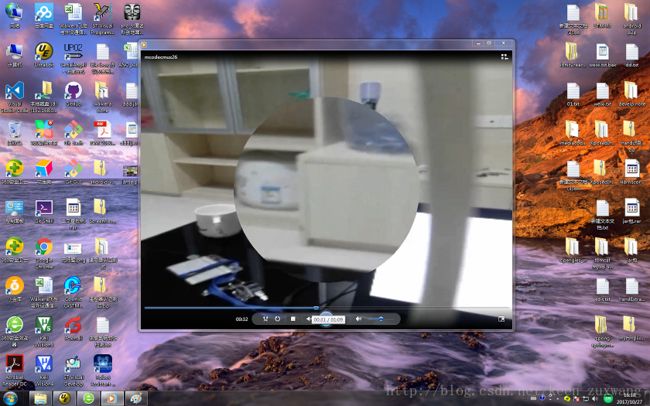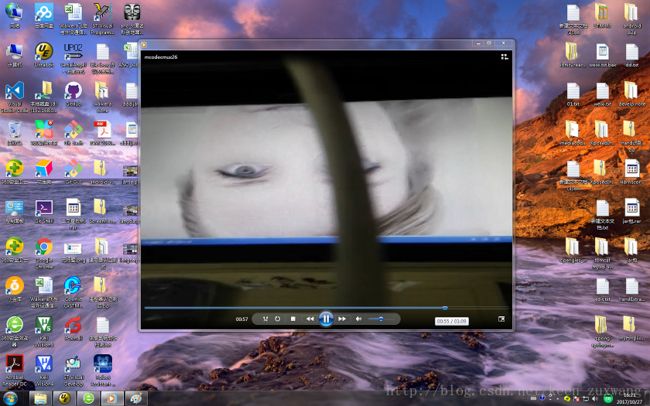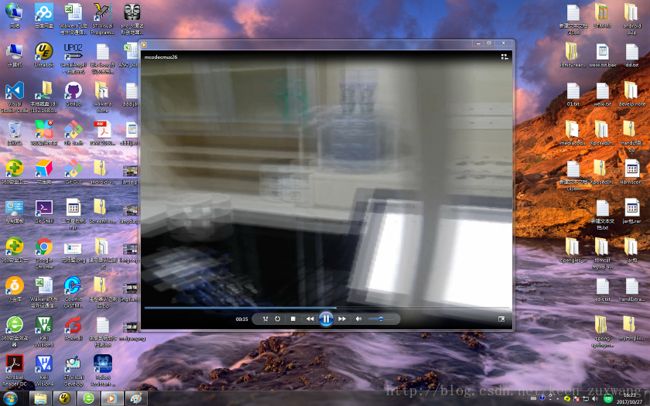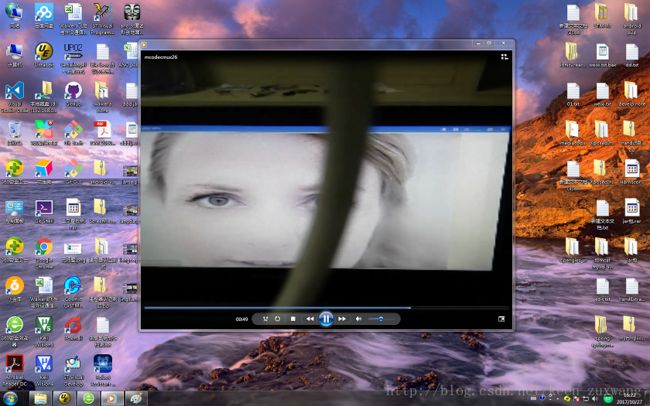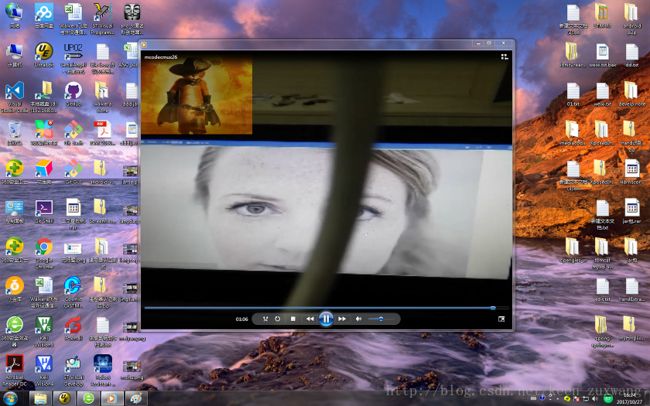Android Camera2 Opengles2.0 预览图像实时滤镜 视频编码
demo:
http://download.csdn.net/download/keen_zuxwang/10042566
对camera2 摄像头预览图像进行各滤镜操作、编码成.H264 & .mp4 视频文件
1、创建顶点位置、纹理数组
2、创建、编译、加载shader程序,获得shader中各变量的句柄(如获取纹理采样sampler2D变量的句柄)
3、程序通过program给shader传递各参量,如:顶点位置、纹理坐标,激活、绑定纹理,传递模型/视图/投影矩阵等, 然后通过glDrawArrays()/glDrawElements()绘制图元(片元着色器通过这些参量计算出每个像素的值、然后通过底层EGL 渲染到相应的ANativeWindow)
camera2 摄像头图像opengles渲染(不通过GLSurfaceView,而是自己实现EGL环境搭建),程序流程:
1、MediaCodec MediaMuxer 视频编码参数设置
mediaFormat.setInteger(MediaFormat.KEY_COLOR_FORMAT, MediaCodecInfo.CodecCapabilities.COLOR_FormatSurface); // 颜色空间设置
2、创建MediaCodec编码器输入界面Surface mEncoderSurface
mEncoderSurface = mCodec.createInputSurface();
3、把该mEncoderSurface传递给底层EGL创建本地EGLSurface — 渲染线程
SurfaceRenderer videoRenderer = new SurfaceRenderer(TextureViewMediaActivity.this, mEncoderSurface, mPreviewView.getWidth(), mPreviewView.getHeight()); 4、渲染线程SurfaceRenderer开启后,初始化EGL,创建本地EGLDisplay、EGLSurface、EGLContext,并绑定前二者到EGLContext
//将Surface转换为本地窗口EGLSurface
EGLSurface eglSurface = egl.eglCreateWindowSurface(eglDisplay, eglConfig, surface, null); // 创建EGLSurface,通过上层传入的Surface surface创建本地EGLSurface(ANativeWindow))5、生成纹理,绑定纹理(外部图像扩展纹理 – 用于生成camera2图像纹理)
GLES20.glGenTextures(1, textures, 0); // 产生纹理id
GLES20.glBindTexture(GLES11Ext.GL_TEXTURE_EXTERNAL_OES, textures[0]);//绑定 纹理id
6、通过该纹理对象,创建SurfaceTexture
SurfaceTexture videoTexture = new SurfaceTexture(textures[0]); //通过创建的纹理id,生成SurfaceTexture
videoTexture.setOnFrameAvailableListener(this); //设置frame可用监听7、生成Surface
Surface surface0 = new Surface(videoRenderer.getVideoTexture()); // 通过创建的SurfaceTexture,生成Surface0,videoRenderer为SurfaceRenderer 实例对象8、添加camera2预览输出Surface Surface0,从而实现camera图像 -> Surface0
mPreviewBuilder = camera.createCaptureRequest(CameraDevice.TEMPLATE_PREVIEW); // 创建camera2 捕获请求,预览模式
//添加预览输出的Surface, 从而实现camera图像 -> Surface
mPreviewBuilder.addTarget(surface);
mPreviewBuilder.addTarget(surface0);
camera.createCaptureSession(Arrays.asList(surface, surface0), mSessionStateCallback, null); // 创建捕获会话 9、当camera2预览图像有效时,videoRenderer渲染线程将执行
videoTexture.updateTexImage(); // 更新SurfaceTexture纹理图像信息,然后绑定的GLES11Ext.GL_TEXTURE_EXTERNAL_OES纹理才能渲染
videoTexture.getTransformMatrix(videoTextureTransform); // 获取SurfaceTexture纹理变换矩
GLES20.glDrawElements() 执行绘制(真正的绘制是由vertex shader & fragment shader 完成)到设定的本地窗口EGLSurface eglSurface10、而本地窗口EGLSurface eglSurface是由上层编码器输入界面Surface mEncoderSurface通过egl.eglCreateWindowSurface(eglDisplay, eglConfig, surface, null)创建的,从而实现了camera2预览图像->Surface0 ->EGLSurface->mEncoderSurface
->MediaCodec/MeidaMuxer的数据流
所以整个摄像头图像渲染、视频编码流程:
camera2预览图像
->Surface0
->videoTexture/videoTexture.updateTexImage()
->GLES20.glBindTexture(GLES11Ext.GL_TEXTURE_EXTERNAL_OES, textures[0])
->GLES20.glDrawElements()
->vertex shader & fragment shader
->EGLSurface
->mEncoderSurface
->MediaCodec/MeidaMuxer
->视频编码数据写入 .H264 & .mp4 视频文件(MediaCodec.Callback实现)
1
、vertex shader
attribute vec4 vPosition;
attribute vec4 vTexCoordinate;
uniform mat4 textureTransform;
uniform mat4 uProjMatrix;
uniform mat4 uProjMatrix0;
uniform int xyFlag; // 镜像选择
//参量传递->fragment shader
varying vec2 v_TexCoordinate;
varying vec4 gPosition;
varying vec2 varyPostion;
void main () {
v_TexCoordinate = (textureTransform * vTexCoordinate).xy;
//gl_Position = vPosition;
if(xyFlag==0){
gl_Position = vPosition;
}else if(xyFlag==1){
gl_Position = uProjMatrix*vPosition; //变换矩左乘
}else if(xyFlag==2){
gl_Position = uProjMatrix0*vPosition;
}
gPosition = gl_Position;
varyPostion = vPosition.xy;
}2、fragment shader
#extension GL_OES_EGL_image_external : require // 外部扩展图像纹理
precision mediump float;
uniform samplerExternalOES texture; //外部扩展纹理采样器变量
uniform sampler2D texture0; //贴图纹理采样器变量
uniform int colorFlag; // 滤镜类型
uniform float mratio; // 纹理融合因子
const highp float mWidth=640.0;
const highp float mHeight=480.0;
const highp vec3 W = vec3(0.299,0.587,0.114);
const mediump vec3 luminanceWeighting = vec3(0.2125, 0.7154, 0.0721); //光亮度里三个值相加要为1,各个值代表着颜色的百分比,中间是绿色的值,70%的比重会让效果更好点。
const lowp float saturation=0.5;
const highp float radius = 1.41;
const highp vec2 center = vec2(0.5, 0.5);
const highp float refractiveIndex=0.5;
//矩形融合区域
const vec2 leftBottom = vec2(-1.0, 0.40);
const vec2 rightTop = vec2(-0.40, 1.0);
//模拟坐标数组
vec2 blurCoordinates[24];
//从vertex shader传入的参量
varying vec4 gPosition;
varying vec2 v_TexCoordinate;
varying vec2 varyPostion;
float hardLight(float color)
{
if(color <= 0.5)
color = color * color * 2.0;
else
color = 1.0 - ((1.0 - color)*(1.0 - color) * 2.0);
return color;
}
void modifyColor(vec4 color){
color.r=max(min(color.r,1.0),0.0);
color.g=max(min(color.g,1.0),0.0);
color.b=max(min(color.b,1.0),0.0);
color.a=max(min(color.a,1.0),0.0);
}
void main(){
if(colorFlag==0){
//矩形区域融合
if (varyPostion.x >= leftBottom.x && varyPostion.x <= rightTop.x
&& varyPostion.y >= leftBottom.y && varyPostion.y <= rightTop.y) {
if(mratio < 0.0000001){ //暖色效果
vec4 color = texture2D(texture, v_TexCoordinate);
vec4 deltaColor = color + vec4(0.1, 0.1, 0.0, 0.0); // 暖色
modifyColor(deltaColor);
gl_FragColor=deltaColor;
}else if(mratio > 0.99){ //放大镜效果
gl_FragColor= texture2D(texture, vec2(v_TexCoordinate.x/2.0+0.25, v_TexCoordinate.y/2.0+0.25)); //nColor;
}else{
vec2 tex0 = vec2((varyPostion.x-leftBottom.x)/(rightTop.x-leftBottom.x),
1.0-(varyPostion.y-leftBottom.y)/(rightTop.y-leftBottom.y));
vec4 color = texture2D(texture0, tex0);
gl_FragColor = color*mratio + texture2D(texture,v_TexCoordinate)*(1.0-mratio); //1.0-v_TexCoordinate
//gl_FragColor = texture2D(texture, 1.0-v_TexCoordinate);
}
}else{
//vec4 color1 = texture2D(texture, v_TexCoordinate);
//vec4 color2 = texture2D(texture0, v_TexCoordinate);//vec2(v_TexCoordinate.s/10, v_TexCoordinate.t/10));
// gl_FragColor = mix(color1, color2, mratio);
gl_FragColor = texture2D(texture, v_TexCoordinate);
}
}
else if(colorFlag==7){
//光亮度里三个值相加要为1,各个值代表着颜色的百分比,中间是绿色的值,70%的比重会让效果更好点。
vec4 textureColor = texture2D(texture, v_TexCoordinate);
float luminance = dot(textureColor.rgb, luminanceWeighting); //GLSL中的点乘运算,线性代数的点运算符相乘两个数字。点乘计算需要将纹理颜色信息和相对应的亮度权重相乘。然后取出所有的三个值相加到一起计算得到这个像素的中和亮度值。
vec3 greyScaleColor = vec3(luminance);
gl_FragColor = vec4(mix(greyScaleColor, textureColor.rgb, saturation), textureColor.w); //用mix函数把计算的灰度值,初识的纹理颜色和得到的饱和度信息结合起来。
}
else if(colorFlag==8){
float aspectRatio = mWidth/mHeight;
vec2 textureCoordinateToUse = vec2(v_TexCoordinate.x, (v_TexCoordinate.y * aspectRatio + 0.5 - 0.5 * aspectRatio));
//归一化坐标空间需要考虑屏幕是一个单位宽和一个单位长。
float distanceFromCenter = distance(center, textureCoordinateToUse); //center
//计算特定像素点距离球形的中心有多远。使用GLSL内建的distance()函数,用勾股定律计算出中心坐标和长宽比矫正过的纹理坐标的距离
float checkForPresenceWithinSphere = step(distanceFromCenter, radius); //计算片段是否在球体内。
distanceFromCenter = distanceFromCenter / radius; //标准化到球心的距离,重新设置distanceFromCenter
float normalizedDepth = radius * sqrt(1.0 - distanceFromCenter * distanceFromCenter); //模拟一个玻璃球,需要计算球的“深度”是多少。
vec3 sphereNormal = normalize(vec3(textureCoordinateToUse - center, normalizedDepth)); //归一化
vec3 refractedVector = refract(vec3(0.0, 0.0, -1.0), sphereNormal, refractiveIndex);
//GLSL的refract()函数以刚才创建的球法线和折射率来计算当光线通过球时从任意一个点看起来如何。
gl_FragColor = texture2D(texture, (refractedVector.xy + 1.0) * 0.5) * checkForPresenceWithinSphere; //最后凑齐所有计算需要的颜色信息。
}
else if(colorFlag==1){ //将此灰度值作为输出颜色的RGB值,这样就会变成黑白滤镜
vec4 color = texture2D(texture, v_TexCoordinate);
float fGrayColor = (0.3*color.r + 0.59*color.g + 0.11*color.b); // 求灰度值
gl_FragColor = vec4(fGrayColor, fGrayColor, fGrayColor, 1.0);
}
else if(colorFlag==2){ //冷暖色调
vec4 color = texture2D(texture, v_TexCoordinate);
vec4 deltaColor = color + vec4(0.1, 0.1, 0.0, 0.0); // 暖色
modifyColor(deltaColor);
gl_FragColor=deltaColor;
}
else if(colorFlag==3){ //增加亮度、降低亮度等
vec4 color = texture2D(texture, v_TexCoordinate);
vec4 deltaColor = color + vec4(0.0, 0.0, 0.1, 0.0); //vec4(0.006, 0.004, 0.002, 0.0); // blue色
modifyColor(deltaColor);
gl_FragColor=deltaColor;
}
else if(colorFlag==4){ //放大镜效果
vec4 nColor=texture2D(texture, v_TexCoordinate);
float uXY = mWidth/mHeight;
vec2 vChange = vec2(0.0, 0.0);
float dis = distance(vec2(gPosition.x, gPosition.y/uXY), vChange);
if(dis < 0.5){ //圆形放大区域
nColor=texture2D(texture,vec2(v_TexCoordinate.x/2.0+0.25, v_TexCoordinate.y/2.0+0.25));
}
gl_FragColor=nColor;
}
else if(colorFlag==5){ //类似高斯模糊、径向模糊
vec4 nColor=texture2D(texture, v_TexCoordinate);
vec3 vChangeColor = vec3(0.025, 0.025, 0.025); // 定义边距
//取周边纹理像素值求平均
nColor+=texture2D(texture,vec2(v_TexCoordinate.x-vChangeColor.r,v_TexCoordinate.y-vChangeColor.r));
nColor+=texture2D(texture,vec2(v_TexCoordinate.x-vChangeColor.r,v_TexCoordinate.y+vChangeColor.r));
nColor+=texture2D(texture,vec2(v_TexCoordinate.x+vChangeColor.r,v_TexCoordinate.y-vChangeColor.r));
nColor+=texture2D(texture,vec2(v_TexCoordinate.x+vChangeColor.r,v_TexCoordinate.y+vChangeColor.r));
nColor+=texture2D(texture,vec2(v_TexCoordinate.x-vChangeColor.g,v_TexCoordinate.y-vChangeColor.g));
nColor+=texture2D(texture,vec2(v_TexCoordinate.x-vChangeColor.g,v_TexCoordinate.y+vChangeColor.g));
nColor+=texture2D(texture,vec2(v_TexCoordinate.x+vChangeColor.g,v_TexCoordinate.y-vChangeColor.g));
nColor+=texture2D(texture,vec2(v_TexCoordinate.x+vChangeColor.g,v_TexCoordinate.y+vChangeColor.g));
nColor+=texture2D(texture,vec2(v_TexCoordinate.x-vChangeColor.b,v_TexCoordinate.y-vChangeColor.b));
nColor+=texture2D(texture,vec2(v_TexCoordinate.x-vChangeColor.b,v_TexCoordinate.y+vChangeColor.b));
nColor+=texture2D(texture,vec2(v_TexCoordinate.x+vChangeColor.b,v_TexCoordinate.y-vChangeColor.b));
nColor+=texture2D(texture,vec2(v_TexCoordinate.x+vChangeColor.b,v_TexCoordinate.y+vChangeColor.b));
nColor/=13.0;
gl_FragColor=nColor;
}
else if(colorFlag==6)
{
float mul_x = 2.0 / mWidth;
float mul_y = 2.0 / mHeight;
float pParams = 0.0;
vec2 pStepOffset = vec2(mul_x, mul_y);
vec3 centralColor = texture2D(texture, v_TexCoordinate).rgb;
blurCoordinates[0] = v_TexCoordinate.xy + pStepOffset * vec2(0.0, -10.0);
blurCoordinates[1] = v_TexCoordinate.xy + pStepOffset * vec2(0.0, 10.0);
blurCoordinates[2] = v_TexCoordinate.xy + pStepOffset * vec2(-10.0, 0.0);
blurCoordinates[3] = v_TexCoordinate.xy + pStepOffset * vec2(10.0, 0.0);
blurCoordinates[4] = v_TexCoordinate.xy + pStepOffset * vec2(5.0, -8.0);
blurCoordinates[5] = v_TexCoordinate.xy + pStepOffset * vec2(5.0, 8.0);
blurCoordinates[6] = v_TexCoordinate.xy + pStepOffset * vec2(-5.0, 8.0);
blurCoordinates[7] = v_TexCoordinate.xy + pStepOffset * vec2(-5.0, -8.0);
blurCoordinates[8] = v_TexCoordinate.xy + pStepOffset * vec2(8.0, -5.0);
blurCoordinates[9] = v_TexCoordinate.xy + pStepOffset * vec2(8.0, 5.0);
blurCoordinates[10] = v_TexCoordinate.xy + pStepOffset * vec2(-8.0, 5.0);
blurCoordinates[11] = v_TexCoordinate.xy + pStepOffset * vec2(-8.0, -5.0);
blurCoordinates[12] = v_TexCoordinate.xy + pStepOffset * vec2(0.0, -6.0);
blurCoordinates[13] = v_TexCoordinate.xy + pStepOffset * vec2(0.0, 6.0);
blurCoordinates[14] = v_TexCoordinate.xy + pStepOffset * vec2(6.0, 0.0);
blurCoordinates[15] = v_TexCoordinate.xy + pStepOffset * vec2(-6.0, 0.0);
blurCoordinates[16] = v_TexCoordinate.xy + pStepOffset * vec2(-4.0, -4.0);
blurCoordinates[17] = v_TexCoordinate.xy + pStepOffset * vec2(-4.0, 4.0);
blurCoordinates[18] = v_TexCoordinate.xy + pStepOffset * vec2(4.0, -4.0);
blurCoordinates[19] = v_TexCoordinate.xy + pStepOffset * vec2(4.0, 4.0);
blurCoordinates[20] = v_TexCoordinate.xy + pStepOffset * vec2(-2.0, -2.0);
blurCoordinates[21] = v_TexCoordinate.xy + pStepOffset * vec2(-2.0, 2.0);
blurCoordinates[22] = v_TexCoordinate.xy + pStepOffset * vec2(2.0, -2.0);
blurCoordinates[23] = v_TexCoordinate.xy + pStepOffset * vec2(2.0, 2.0);
float sampleColor = centralColor.g * 22.0;
sampleColor += texture2D(texture, blurCoordinates[0]).g;
sampleColor += texture2D(texture, blurCoordinates[1]).g;
sampleColor += texture2D(texture, blurCoordinates[2]).g;
sampleColor += texture2D(texture, blurCoordinates[3]).g;
sampleColor += texture2D(texture, blurCoordinates[4]).g;
sampleColor += texture2D(texture, blurCoordinates[5]).g;
sampleColor += texture2D(texture, blurCoordinates[6]).g;
sampleColor += texture2D(texture, blurCoordinates[7]).g;
sampleColor += texture2D(texture, blurCoordinates[8]).g;
sampleColor += texture2D(texture, blurCoordinates[9]).g;
sampleColor += texture2D(texture, blurCoordinates[10]).g;
sampleColor += texture2D(texture, blurCoordinates[11]).g;
sampleColor += texture2D(texture, blurCoordinates[12]).g * 2.0;
sampleColor += texture2D(texture, blurCoordinates[13]).g * 2.0;
sampleColor += texture2D(texture, blurCoordinates[14]).g * 2.0;
sampleColor += texture2D(texture, blurCoordinates[15]).g * 2.0;
sampleColor += texture2D(texture, blurCoordinates[16]).g * 2.0;
sampleColor += texture2D(texture, blurCoordinates[17]).g * 2.0;
sampleColor += texture2D(texture, blurCoordinates[18]).g * 2.0;
sampleColor += texture2D(texture, blurCoordinates[19]).g * 2.0;
sampleColor += texture2D(texture, blurCoordinates[20]).g * 3.0;
sampleColor += texture2D(texture, blurCoordinates[21]).g * 3.0;
sampleColor += texture2D(texture, blurCoordinates[22]).g * 3.0;
sampleColor += texture2D(texture, blurCoordinates[23]).g * 3.0;
sampleColor = sampleColor / 62.0;
float highPass = centralColor.g - sampleColor + 0.5;
for(int i = 0; i < 5;i++)
{
highPass = hardLight(highPass);
}
float luminance = dot(centralColor, W);
float alpha = pow(luminance, pParams);
vec3 smoothColor = centralColor + (centralColor-vec3(highPass))*alpha*0.1;
gl_FragColor = vec4(mix(smoothColor.rgb, max(smoothColor, centralColor), alpha), 1.0);
}
}3、shader工具类
public class HelpUtils
{
private static final String TAG = "ShaderHelper";
public static int compileShader(final int shaderType, final String shaderSource)
{
int shaderHandle = GLES20.glCreateShader(shaderType);
if (shaderHandle != 0)
{
// Pass in the shader source.
GLES20.glShaderSource(shaderHandle, shaderSource);
// Compile the shader.
GLES20.glCompileShader(shaderHandle);
// Get the compilation status.
final int[] compileStatus = new int[1];
GLES20.glGetShaderiv(shaderHandle, GLES20.GL_COMPILE_STATUS, compileStatus, 0);
// If the compilation failed, delete the shader.
if (compileStatus[0] == 0)
{
Log.e(TAG, "Error compiling shader: " + GLES20.glGetShaderInfoLog(shaderHandle));
GLES20.glDeleteShader(shaderHandle);
shaderHandle = 0;
}
}
if (shaderHandle == 0){
throw new RuntimeException("Error creating shader.");
}
return shaderHandle;
}
public static int createAndLinkProgram(final int vertexShaderHandle, final int fragmentShaderHandle, final String[] attributes)
{
int programHandle = GLES20.glCreateProgram();
if (programHandle != 0)
{
// Bind the vertex shader to the program.
GLES20.glAttachShader(programHandle, vertexShaderHandle);
// Bind the fragment shader to the program.
GLES20.glAttachShader(programHandle, fragmentShaderHandle);
// Bind attributes
if (attributes != null){
final int size = attributes.length;
for (int i = 0; i < size; i++){
GLES20.glBindAttribLocation(programHandle, i, attributes[i]);
}
}
// Link the two shaders together into a program.
GLES20.glLinkProgram(programHandle);
// Get the link status.
final int[] linkStatus = new int[1];
GLES20.glGetProgramiv(programHandle, GLES20.GL_LINK_STATUS, linkStatus, 0);
// If the link failed, delete the program.
if (linkStatus[0] == 0) {
Log.e(TAG, "Error compiling program: " + GLES20.glGetProgramInfoLog(programHandle));
GLES20.glDeleteProgram(programHandle);
programHandle = 0;
}
}
if (programHandle == 0){
throw new RuntimeException("Error creating program.");
}
return programHandle;
}
public static int loadTexture(final Context context, final int resourceId) {
final int[] textureHandle = new int[1];
GLES20.glGenTextures(1, textureHandle, 0);
if (textureHandle[0] != 0) {
final BitmapFactory.Options options = new BitmapFactory.Options();
options.inScaled = false; // No pre-scaling
// Read in the resource
final Bitmap bitmap = BitmapFactory.decodeResource(
context.getResources(), resourceId, options);
// Bind to the texture in OpenGL
GLES20.glBindTexture(GLES20.GL_TEXTURE_2D, textureHandle[0]);
// Set filtering
GLES20.glTexParameteri(GLES20.GL_TEXTURE_2D,
GLES20.GL_TEXTURE_MIN_FILTER, GLES20.GL_NEAREST);
GLES20.glTexParameteri(GLES20.GL_TEXTURE_2D,
GLES20.GL_TEXTURE_MAG_FILTER, GLES20.GL_NEAREST);
// Load the bitmap into the bound texture.
GLUtils.texImage2D(GLES20.GL_TEXTURE_2D, 0, bitmap, 0);
// Recycle the bitmap, since its data has been loaded into OpenGL.
bitmap.recycle();
}
if (textureHandle[0] == 0) {
throw new RuntimeException("Error loading texture.");
}
return textureHandle[0];
}
public static String readTextFileFromRawResource(final Context context,
final int resourceId)
{
final InputStream inputStream = context.getResources().openRawResource(
resourceId);
final InputStreamReader inputStreamReader = new InputStreamReader(
inputStream);
final BufferedReader bufferedReader = new BufferedReader(
inputStreamReader);
String nextLine;
final StringBuilder body = new StringBuilder();
try{
while ((nextLine = bufferedReader.readLine()) != null){
body.append(nextLine);
body.append('\n');
}
}
catch (IOException e){
return null;
}
return body.toString();
}
//从sh脚本中加载shader内容的方法
public static String loadFromAssetsFile(String fname,Resources r)
{
String result=null;
try {
InputStream in=r.getAssets().open(fname);
int ch=0;
ByteArrayOutputStream baos = new ByteArrayOutputStream();
while((ch=in.read())!=-1) {
baos.write(ch);
}
byte[] buff=baos.toByteArray();
baos.close();
in.close();
result=new String(buff,"UTF-8");
result=result.replaceAll("\\r\\n","\n");
}
catch(Exception e){
e.printStackTrace();
}
return result;
}
}4、shader 操作类
public class SurfaceRenderer implements Runnable, SurfaceTexture.OnFrameAvailableListener{
public static String LOG_TAG = SurfaceRenderer.class.getSimpleName();
private static float squareCoords[] = {
-1.0f, 1.0f, // top left
-1.0f, -1.0f, // bottom left
1.0f, -1.0f, // bottom right
1.0f, 1.0f // top right
};
private static short drawOrder[] = { 0, 1, 2, 0, 2, 3};
// Texture to be shown in backgrund
private float textureCoords[] = {
0.0f, 1.0f, 0.0f, 1.0f,
0.0f, 0.0f, 0.0f, 1.0f,
1.0f, 0.0f, 0.0f, 1.0f,
1.0f, 1.0f, 0.0f, 1.0f
};
private int[] textures = new int[1];
private Context context;
private int shaderProgram;
private FloatBuffer vertexBuffer;
private FloatBuffer textureBuffer;
private ShortBuffer drawListBuffer;
private SurfaceTexture videoTexture;
private float[] videoTextureTransform;
private boolean frameAvailable = false;
int textureParamHandle;
int textureCoordinateHandle;
int positionHandle;
int textureTranformHandle;
protected Surface surface;
protected int width;
protected int height;
private EGL10 egl;
private EGLContext eglContext;
private EGLDisplay eglDisplay;
private EGLSurface eglSurface;
TextureViewMediaActivity instance;
public boolean running = false;
public SurfaceRenderer(Context context, Surface surface, int width, int height) {
Log.e("TAG", " SurfaceRenderer create ");
this.surface = surface;
this.width = width;
this.height = height;
this.running = true;
this.context = context;
instance = (TextureViewMediaActivity)context;
videoTextureTransform = new float[16];
Thread thread = new Thread(this); // 渲染线程
thread.start();
}
@Override
public void run() {
initEGL();
initGLComponents();
Log.d(LOG_TAG, "OpenGL init OK. start draw...");
while (running) {
if (draw()) {
//EGL交换缓存区,实现双缓存交换并刷新显示缓存(由底层的FramebufferNativeWindow输出--FramebufferNativeWindo是ANativeWindow的继承类,其内部实现了queuebuffer dequeuebuffer等操作)
//双缓冲刷新 front buffer 和 back buffer
//eglSwapBuffers会去触发queuebuffer,dequeuebuffer,
//queuebuffer将画好的buffer(back->front)交给surfaceflinger处理,
//dequeuebuffer新创建一个buffer用来画图
egl.eglSwapBuffers(eglDisplay, eglSurface);
}
}
deinitGLComponents();
deinitEGL();
}
private void initEGL() {
egl = (EGL10)EGLContext.getEGL();
//
eglDisplay = egl.eglGetDisplay(EGL10.EGL_DEFAULT_DISPLAY);
//version
int version[] = new int[2];
egl.eglInitialize(eglDisplay, version); // 初始化显示设备、获取EGL版本号
EGLConfig eglConfig = chooseEglConfig();
//将Surface转换为本地窗口
eglSurface = egl.eglCreateWindowSurface(eglDisplay, eglConfig, surface, null); // 创建EGLSurface,通过上层传入的Surface surface创建本地EGLSurface(ANativeWindow)
eglContext = createContext(egl, eglDisplay, eglConfig);
try {
if (eglSurface == null || eglSurface == EGL10.EGL_NO_SURFACE) {
throw new RuntimeException("GL error:" + GLUtils.getEGLErrorString(egl.eglGetError()));
}
//将EGLDisplay、EGLSurface和EGLContext进行绑定(渲染上下文绑定到渲染面,指定当前的环境为绘制环境 EGLContext->context)
///eglMakeCurrent后生成的surface就可以利用opengl画图了
if (!egl.eglMakeCurrent(eglDisplay, eglSurface, eglSurface, eglContext)) { // 绑定EGLSurface到本地EGLContext上下文,实现上层opengles的surface到底层egl的eglSurface的全局环境绑定
throw new RuntimeException("GL Make current Error"+ GLUtils.getEGLErrorString(egl.eglGetError()));
}
}catch (Exception e) {
e.printStackTrace();
}
}
private void deinitEGL() {
egl.eglMakeCurrent(eglDisplay, EGL10.EGL_NO_SURFACE, EGL10.EGL_NO_SURFACE, EGL10.EGL_NO_CONTEXT);
egl.eglDestroySurface(eglDisplay, eglSurface);
egl.eglDestroyContext(eglDisplay, eglContext);
egl.eglTerminate(eglDisplay);
Log.d(LOG_TAG, "OpenGL deinit OK.");
}
//创建EGL环境, EGLContext: OpenGL ES图形上下文,它代表了OpenGL状态机
private EGLContext createContext(EGL10 egl, EGLDisplay eglDisplay, EGLConfig eglConfig) {
//EGLContext 属性
int[] attrs = {
EGL14.EGL_CONTEXT_CLIENT_VERSION, 2, // opengles 客户版本 2.0
EGL10.EGL_NONE
};
return egl.eglCreateContext(eglDisplay, eglConfig, EGL10.EGL_NO_CONTEXT, attrs); //根据EGLContext属性、EGLConfig配置,创建EGLContext(egl上下文)
}
//
private EGLConfig chooseEglConfig() {
int[] configsCount = new int[1];
EGLConfig[] configs = new EGLConfig[1];
int[] attributes = getAttributes();
int confSize = 1;
if (!egl.eglChooseConfig(eglDisplay, attributes, configs, confSize, configsCount)) {
throw new IllegalArgumentException("Failed to choose config:"+ GLUtils.getEGLErrorString(egl.eglGetError()));
}
else if (configsCount[0] > 0) {
return configs[0];
}
return null;
}
//EGLConfig 属性
private int[] getAttributes()
{
return new int[] {
EGL10.EGL_RENDERABLE_TYPE, EGL14.EGL_OPENGL_ES2_BIT, //渲染类型 EGL_OPENGL_ES2
EGL10.EGL_RED_SIZE, 8, // 渲染rgba大小
EGL10.EGL_GREEN_SIZE, 8,
EGL10.EGL_BLUE_SIZE, 8,
EGL10.EGL_ALPHA_SIZE, 8,
EGL10.EGL_DEPTH_SIZE, 0, // EGL_DEPTH_SIZE 深度、模板尺寸
EGL10.EGL_STENCIL_SIZE, 0,
EGL10.EGL_NONE
};
}
public void onPause(){
running = false;
}
@Override
protected void finalize() throws Throwable {
super.finalize();
running = false;
}
public int mColorFlag=0;
public int xyFlag=0;
public int mRatio;
public float ratio=0.5f;
public int textureHandle;
public int textureIdOne;
private int gHWidth;
private int gHHeight;
private float[] matrix=new float[16];
private float[] matrix0=new float[16];
private float[] mModelMatrix=new float[16];
private float[] mModelMatrix0=new float[16];
//镜像
public float[] flip(float[] m,boolean x,boolean y){
if(x||y){
Matrix.scaleM(m,0,x?-1:1,y?-1:1,1);
}
return m;
}
public void setSize(){
Matrix.setIdentityM(mModelMatrix,0);
Matrix.setIdentityM(mModelMatrix0,0);
matrix = flip(mModelMatrix, true, false);
matrix0 = flip(mModelMatrix0, false, true);
}
private void setupGraphics()
{
final String vertexShader = HelpUtils.readTextFileFromRawResource(context, R.raw.vetext_sharder);
final String fragmentShader = HelpUtils.readTextFileFromRawResource(context, R.raw.fragment_sharder);
final int vertexShaderHandle = HelpUtils.compileShader(GLES20.GL_VERTEX_SHADER, vertexShader);
final int fragmentShaderHandle = HelpUtils.compileShader(GLES20.GL_FRAGMENT_SHADER, fragmentShader);
shaderProgram = HelpUtils.createAndLinkProgram(vertexShaderHandle, fragmentShaderHandle,
new String[]{"texture","vPosition","vTexCoordinate","textureTransform"});
GLES20.glUseProgram(shaderProgram);
textureParamHandle = GLES20.glGetUniformLocation(shaderProgram, "texture"); // 摄像头图像外部扩展纹理
textureCoordinateHandle = GLES20.glGetAttribLocation(shaderProgram, "vTexCoordinate"); // 顶点纹理坐标
positionHandle = GLES20.glGetAttribLocation(shaderProgram, "vPosition"); // 顶点坐标
textureTranformHandle = GLES20.glGetUniformLocation(shaderProgram, "textureTransform");
textureHandle = GLES20.glGetUniformLocation(shaderProgram, "texture0"); // 获得贴图对应的纹理采样器句柄(索引)
mRatio = GLES20.glGetUniformLocation(shaderProgram, "mratio"); // 融合因子
gHWidth=GLES20.glGetUniformLocation(shaderProgram,"mWidth"); // 视窗宽、高
gHHeight=GLES20.glGetUniformLocation(shaderProgram,"mHeight");
GLES20.glUniform1i(gHWidth,width);
GLES20.glUniform1i(gHHeight,height);
setSize();
}
private void setupVertexBuffer()
{
// Draw list buffer
ByteBuffer dlb = ByteBuffer.allocateDirect(drawOrder. length * 2);
dlb.order(ByteOrder.nativeOrder()); //转换成本地字节序
drawListBuffer = dlb.asShortBuffer();
drawListBuffer.put(drawOrder);
drawListBuffer.position(0);
// Initialize the texture holder
ByteBuffer bb = ByteBuffer.allocateDirect(squareCoords.length * 4);
bb.order(ByteOrder.nativeOrder()); //转换成本地字节序
vertexBuffer = bb.asFloatBuffer();
vertexBuffer.put(squareCoords);
vertexBuffer.position(0);
}
private void setupTexture()
{
ByteBuffer texturebb = ByteBuffer.allocateDirect(textureCoords.length * 4);
texturebb.order(ByteOrder.nativeOrder()); // 转换成本地字节序
textureBuffer = texturebb.asFloatBuffer();
textureBuffer.put(textureCoords);
textureBuffer.position(0);
// Generate the actual texture
GLES20.glActiveTexture(GLES20.GL_TEXTURE0); // 激活(使能)相应的纹理单元
GLES20.glGenTextures(1, textures, 0); // 产生纹理id
checkGlError("Texture generate");
GLES20.glBindTexture(GLES11Ext.GL_TEXTURE_EXTERNAL_OES, textures[0]); //通过纹理id,绑定到相应的纹理单元,纹理单元内存放的类型可以很多种,比如GLES20.GL_TEXTURE_1D、GLES20.GL_TEXTURE_2D、GLES20.GL_TEXTURE_3D、GLES11Ext.GL_TEXTURE_EXTERNAL_OES等
checkGlError("Texture bind");
videoTexture = new SurfaceTexture(textures[0]); // 通过创建的纹理id,生成SurfaceTexture
videoTexture.setOnFrameAvailableListener(this);
}
public int initTexture(int drawableId)
{
//生成纹理ID
int[] textures = new int[1];
GLES20.glGenTextures
(
1, //产生的纹理id的数量
textures, //纹理id的数组
0 //偏移量
);
int textureId = textures[0];
Log.i(LOG_TAG, " initTexture textureId = " + textureId);
GLES20.glBindTexture(GLES20.GL_TEXTURE_2D, textureId);
GLES20.glTexParameterf(GLES20.GL_TEXTURE_2D, GLES20.GL_TEXTURE_MIN_FILTER,GLES20.GL_NEAREST); // 纹素放大、缩小设置GL_LINEAR对应线性滤波,GL_NEAREST对应最近邻滤波方式
GLES20.glTexParameterf(GLES20.GL_TEXTURE_2D,GLES20.GL_TEXTURE_MAG_FILTER,GLES20.GL_LINEAR);
GLES20.glTexParameterf(GLES20.GL_TEXTURE_2D, GLES20.GL_TEXTURE_WRAP_S,GLES20.GL_CLAMP_TO_EDGE); // 纹理边界处理,当纹理坐标超出[0,1]的范围时该怎么处理,GL_CLAMP_TO_EDGE --- 纹理坐标会被截断到[0,1]之间。坐标值大的被截断到纹理的边缘部分,形成了一个拉伸的边缘
GLES20.glTexParameterf(GLES20.GL_TEXTURE_2D, GLES20.GL_TEXTURE_WRAP_T,GLES20.GL_CLAMP_TO_EDGE);
//加载图片
InputStream is = context.getResources().openRawResource(drawableId);
Bitmap bitmapTmp;
try {
bitmapTmp = BitmapFactory.decodeStream(is);
} finally {
try {
is.close();
}
catch(IOException e) {
e.printStackTrace();
}
}
//载纹理
GLUtils.texImage2D
(
GLES20.GL_TEXTURE_2D, //纹理类型,在OpenGL ES中必须为GL10.GL_TEXTURE_2D
0, //纹理的层次,0表示基本图像层,直接贴图
bitmapTmp, //纹理图像
0 //纹理边框尺寸
);
bitmapTmp.recycle(); //纹理加载成功后释放图片
return textureId;
}
protected boolean draw()
{
synchronized (this){
if (frameAvailable) {
videoTexture.updateTexImage(); // 更新SurfaceTexture纹理图像信息,然后绑定的GLES11Ext.GL_TEXTURE_EXTERNAL_OES纹理才能渲染
videoTexture.getTransformMatrix(videoTextureTransform); // 获取SurfaceTexture纹理变换矩
frameAvailable = false;
}
else{
return false;
}
}
GLES20.glClearColor(0.0f, 0.0f, 0.0f, 0.0f); //设置清除颜色
GLES20.glClear(GLES20.GL_COLOR_BUFFER_BIT);
//GL_COLOR_BUFFER_BIT 设置窗口颜色
//GL_DEPTH_BUFFER_BIT 设置深度缓存--把所有像素的深度值设置为最大值(一般为远裁剪面)
GLES20.glViewport(0, 0, width, height);
drawTexture();
return true;
}
private void drawTexture() {
// Draw texture
int mHProjMatrix=GLES20.glGetUniformLocation(shaderProgram,"uProjMatrix");
GLES20.glUniformMatrix4fv(mHProjMatrix,1,false,matrix,0);
int mHProjMatrix0=GLES20.glGetUniformLocation(shaderProgram,"uProjMatrix0");
GLES20.glUniformMatrix4fv(mHProjMatrix0,1,false,matrix0,0);
int mXyFlag = GLES20.glGetUniformLocation(shaderProgram, "xyFlag"); //镜像类型: x镜像,y镜像---通过不同的变化矩阵与顶点位置向量进行左乘,如:uProjMatrix*vPosition;
GLES20.glUniform1i(mXyFlag, xyFlag);
int mColorFlagHandle = GLES20.glGetUniformLocation(shaderProgram, "colorFlag"); // 纹理操作类型(滤镜处理):饱和度/灰度/冷暖色/放大镜/模糊/美颜/纹理融合
GLES20.glUniform1i(mColorFlagHandle, mColorFlag);
//顶点属性一般包括位置、颜色、法线、纹理坐标属性
GLES20.glEnableVertexAttribArray(positionHandle); // 使能相应的顶点位置属性的顶点属性数组
GLES20.glVertexAttribPointer(positionHandle, 2, GLES20.GL_FLOAT, false, 0, vertexBuffer); // 指定(绑定)该相应的顶点位置属性的顶点属性数组
GLES20.glBindTexture(GLES11Ext.GL_TEXTURE_EXTERNAL_OES, textures[0]); // 摄像头图像纹理
GLES20.glActiveTexture(GLES20.GL_TEXTURE0);
GLES20.glUniform1i(textureParamHandle, 0);
GLES20.glActiveTexture(GLES20.GL_TEXTURE1);
GLES20.glBindTexture(GLES20.GL_TEXTURE_2D, textureIdOne); // 贴图的图像纹理
GLES20.glUniform1i(textureHandle, 1);
GLES20.glEnableVertexAttribArray(textureCoordinateHandle);
GLES20.glVertexAttribPointer(textureCoordinateHandle, 4, GLES20.GL_FLOAT, false, 0, textureBuffer);
GLES20.glUniformMatrix4fv(textureTranformHandle, 1, false, videoTextureTransform, 0); // GL_TEXTURE_EXTERNAL_OES纹理的变化矩
GLES20.glUniform1f(mRatio, ratio); // 纹理融合因子
GLES20.glDrawElements(GLES20.GL_TRIANGLE_STRIP, drawOrder.length, GLES20.GL_UNSIGNED_SHORT, drawListBuffer); // 根据顶点位置索引进行绘制片元
GLES20.glDisableVertexAttribArray(positionHandle);
GLES20.glDisableVertexAttribArray(textureCoordinateHandle);
}
protected void initGLComponents() {
setupVertexBuffer();
setupTexture();
setupGraphics();
textureIdOne = initTexture(R.drawable.bg);
Message message = new Message();
message.what = 1;
instance.myHandler.sendMessage(message);
}
protected void deinitGLComponents() {
GLES20.glDeleteTextures(1, textures, 0);
GLES20.glDeleteProgram(shaderProgram);
videoTexture.release();
videoTexture.setOnFrameAvailableListener(null);
}
public void checkGlError(String op) {
int error;
while ((error = GLES20.glGetError()) != GLES20.GL_NO_ERROR) {
Log.e("SurfaceTest", op + ": glError " + GLUtils.getEGLErrorString(error));
}
}
public SurfaceTexture getVideoTexture() {
return videoTexture;
}
@Override
public void onFrameAvailable(SurfaceTexture surfaceTexture) {
synchronized (this){
frameAvailable = true;
}
}
}5、设置camera2 预览、mediacodec/medianuxer 视频编码设置
public class TextureViewMediaActivity extends Activity implements TextureView.SurfaceTextureListener{
private static final String TAG = "GLViewMediaActivity";
private boolean clickFlag = false;
public static final String videoPath = Environment.getExternalStorageDirectory()+"/live.mp4";
private SurfaceRenderer videoRenderer;
private Button btn_shutter, btn_mirror, btn_color;
Surface mEncoderSurface;
BufferedOutputStream outputStream;
private MediaCodec mCodec, mDecodec;
boolean isEncode = false;
private MediaMuxer mMuxer;
TextureView mPreviewView;
CameraCaptureSession mSession;
CaptureRequest.Builder mPreviewBuilder;
public CameraDevice mCameraDevice;
@Override
protected void onCreate(Bundle savedInstanceState) {
super.onCreate(savedInstanceState);
requestWindowFeature(Window.FEATURE_NO_TITLE);
setContentView(R.layout.activity_main_0);
mPreviewView = (TextureView) findViewById(R.id.id_textureview);
mPreviewView.setSurfaceTextureListener(this);
SeekBar seekBar = (SeekBar) findViewById(R.id.id_seekBar);
seekBar.setOnSeekBarChangeListener(new SeekBar.OnSeekBarChangeListener() {
@Override
public void onProgressChanged(SeekBar seekBar, int progress, boolean fromUser) {
// TODO Auto-generated method stub
if(videoRenderer != null) {
videoRenderer.ratio = progress/100.0f; // 贴图纹理 & 摄像头图像外部扩展纹理的融合因子
}
}
@Override
public void onStartTrackingTouch(SeekBar seekBar) {
// TODO Auto-generated method stub
}
@Override
public void onStopTrackingTouch(SeekBar seekBar) {
// TODO Auto-generated method stub
}
});
btn_color = (Button) findViewById(R.id.btn_color);
btn_shutter = (Button) findViewById(R.id.btn_shutter);
btn_mirror = (Button) findViewById(R.id.btn_mirror);
btn_shutter.setOnClickListener(new OnClickListener() {
@Override
public void onClick(View v) {
// TODO Auto-generated method stub
clickFlag = !clickFlag;
if(clickFlag) {
Toast.makeText(TextureViewMediaActivity.this, "Start Record!", Toast.LENGTH_SHORT).show();
btn_shutter.setText("Stop");
startCodec(); //1、mediacodec mediamuxer 视频编码参数设置、并把创建渲染线程SurfaceRenderer videoRenderer;
}else {
Toast.makeText(TextureViewMediaActivity.this, "Stop Record!", Toast.LENGTH_SHORT).show();
btn_shutter.setText("Start");
try {
mSession.stopRepeating();
mSession.close();
} catch (CameraAccessException e) {
// TODO Auto-generated catch block
e.printStackTrace();
}
stopCodec(); //
/*
Intent intent = new Intent(Intent.ACTION_VIEW);
intent.setDataAndType(Uri.parse(Environment.getExternalStorageDirectory().getAbsolutePath()+"/mcodecmux26.mp4"), "video/mp4");
startActivity(intent);
*/
}
}
});
btn_color.setOnClickListener(new OnClickListener() {
@Override
public void onClick(View v) {
// TODO Auto-generated method stub
// 滤镜类型选择
if(videoRenderer != null) {
if(videoRenderer.mColorFlag == 0) {
videoRenderer.mColorFlag = 7;
Toast.makeText(TextureViewMediaActivity.this, "Saturation adjust!", Toast.LENGTH_SHORT).show();
}else if(videoRenderer.mColorFlag == 7) {
videoRenderer.mColorFlag = 1;
Toast.makeText(TextureViewMediaActivity.this, "Gray Color!", Toast.LENGTH_SHORT).show();
}else if(videoRenderer.mColorFlag == 1) {
videoRenderer.mColorFlag = 2;
Toast.makeText(TextureViewMediaActivity.this, "Warm Color!", Toast.LENGTH_SHORT).show();
}else if(videoRenderer.mColorFlag == 2){
videoRenderer.mColorFlag = 3;
Toast.makeText(TextureViewMediaActivity.this, "Cool Color!", Toast.LENGTH_SHORT).show();
}else if(videoRenderer.mColorFlag == 3){
videoRenderer.mColorFlag = 4;
Toast.makeText(TextureViewMediaActivity.this, "Amplify!", Toast.LENGTH_SHORT).show();
}else if(videoRenderer.mColorFlag == 4){
videoRenderer.mColorFlag = 5;
Toast.makeText(TextureViewMediaActivity.this, "Vague!", Toast.LENGTH_SHORT).show();
}else if(videoRenderer.mColorFlag == 5){
videoRenderer.mColorFlag = 6;
Toast.makeText(TextureViewMediaActivity.this, "Beauty!", Toast.LENGTH_SHORT).show();
}else if(videoRenderer.mColorFlag ==6){
videoRenderer.mColorFlag = 0;
Toast.makeText(TextureViewMediaActivity.this, "Orignal Color!", Toast.LENGTH_SHORT).show();
}
}
}
});
btn_mirror.setOnClickListener(new OnClickListener() {
@Override
public void onClick(View v) {
// TODO Auto-generated method stub
//X 、Y轴镜像选择
if(videoRenderer != null) {
if(videoRenderer.xyFlag == 0) {
Toast.makeText(TextureViewMediaActivity.this, "X Mirror!", Toast.LENGTH_SHORT).show();
videoRenderer.xyFlag = 1;
}else if(videoRenderer.xyFlag == 1){
videoRenderer.xyFlag = 2;
Toast.makeText(TextureViewMediaActivity.this, "Y Mirror!", Toast.LENGTH_SHORT).show();
}else if(videoRenderer.xyFlag == 2) {
videoRenderer.xyFlag = 0;
Toast.makeText(TextureViewMediaActivity.this, "Normal!", Toast.LENGTH_SHORT).show();
}
}
}
});
}
public Handler myHandler = new Handler() {
public void handleMessage(Message msg) {
switch (msg.what) {
case 1:
Log.d(TAG," videoTexture created! ");
try {
startPreview(mCameraDevice); //3、渲染线程SurfaceRenderer发送消息来开启camera2预览,camera2输出的图像数据将输出到设定的预览目标界面surface & surface0
} catch (CameraAccessException e) {
// TODO Auto-generated catch block
e.printStackTrace();
}
break;
default :
break;
}
super.handleMessage(msg);
}
};
private String path = Environment.getExternalStorageDirectory() + "/mcodecv26.264";
private String mOutputPath = Environment.getExternalStorageDirectory() + "/mcodecmux26.mp4";
public void startCodec() {
for(int i=0; i<2; i++)
{
File f = null;
if(i == 0) {
f = new File(path);
}else if(i == 1) {
f = new File(mOutputPath);
}
if(!f.exists()){
try {
f.createNewFile();
Log.e(TAG, " create a file ");
} catch (IOException e) {
// TODO Auto-generated catch block
e.printStackTrace();
}
}else{
if(f.delete()){
try {
f.createNewFile();
Log.e(TAG, " delete and create a file ");
} catch (IOException e) {
// TODO Auto-generated catch block
e.printStackTrace();
}
}
}
if(i == 0) {
try {
outputStream = new BufferedOutputStream(new FileOutputStream(f));
Log.i(TAG, "outputStream initialized");
} catch (Exception e){
e.printStackTrace();
}
}
}
try {
mCodec = MediaCodec.createEncoderByType(MediaFormat.MIMETYPE_VIDEO_AVC); // 通过mime type创建MediaCodec avc编码器
//mCodec = MediaCodec.createByCodecName(codecInfo.getName());
} catch (IOException e) {
e.printStackTrace();
}
MediaFormat mediaFormat = MediaFormat.createVideoFormat(MediaFormat.MIMETYPE_VIDEO_AVC, mPreviewView.getWidth(), mPreviewView.getHeight());
mediaFormat.setInteger(MediaFormat.KEY_BIT_RATE, 500000);//500kbps
mediaFormat.setInteger(MediaFormat.KEY_FRAME_RATE, 15);
//mediaFormat.setInteger("bitrate-mode", 2);
//mediaFormat.setInteger(MediaFormat.KEY_COLOR_FORMAT, MediaCodecInfo.CodecCapabilities.COLOR_FormatYUV420Flexible);
mediaFormat.setInteger(MediaFormat.KEY_COLOR_FORMAT, MediaCodecInfo.CodecCapabilities.COLOR_FormatSurface);
mediaFormat.setInteger(MediaFormat.KEY_I_FRAME_INTERVAL, 1);
mCodec.configure(mediaFormat, null, null, MediaCodec.CONFIGURE_FLAG_ENCODE);
mEncoderSurface = mCodec.createInputSurface(); // 2、创建MediaCodec编码器输入界面 mEncoderSurface
Log.i(TAG, " startCodec 22 ");
//设置MediaCodec 编码回调,视频编码后的数据处理过程在该回调函数中进行处理
mCodec.setCallback(new EncoderCallback());
mCodec.start();
Log.i(TAG, " startCodec ");
try {
mMuxer = new MediaMuxer(mOutputPath, MediaMuxer.OutputFormat.MUXER_OUTPUT_MPEG_4); // 创建MediaMuxer,设置输出路径,输出文件格式
} catch (IOException e) {
// TODO Auto-generated catch block
e.printStackTrace();
}
// 2、并把该mEncoderSurface传递给底层EGL创建本地EGLSurface
videoRenderer = new SurfaceRenderer(TextureViewMediaActivity.this, mEncoderSurface, mPreviewView.getWidth(), mPreviewView.getHeight());
videoRenderer.mColorFlag = 1;
}
public void stopCodec() {
try {
if(mCodec != null) {
videoRenderer.running = false;
mCodec.stop();
mCodec.release();
mCodec = null;
mMuxer.stop();
mMuxer.release();
mMuxer=null;
mVideoTrack=-1;
Log.i(TAG, " stopCodec ");
}
} catch (Exception e) {
e.printStackTrace();
mCodec = null;
}
}
int mCount = 0;
private int mVideoTrack=-1;
private boolean isMuxStarted=false;
//camera2 异步编码回调
private class EncoderCallback extends MediaCodec.Callback{
@Override
public void onInputBufferAvailable(MediaCodec codec, int index) {
//
}
@Override
public void onOutputBufferAvailable(MediaCodec codec, int index, MediaCodec.BufferInfo info) {
ByteBuffer outPutByteBuffer = mCodec.getOutputBuffer(index);
byte[] outDate = new byte[info.size];
outPutByteBuffer.get(outDate);
try {
//Log.d(TAG, " outDate.length : " + outDate.length);
outputStream.write(outDate, 0, outDate.length); // 视频编码数据到.h264文件
} catch (IOException e) {
// TODO Auto-generated catch block
e.printStackTrace();
}
if(isMuxStarted && info.size>0 && info.presentationTimeUs>0){
mMuxer.writeSampleData(mVideoTrack, outPutByteBuffer, info); // MediaMuxer写编码数据到.mp4文件
}
mCodec.releaseOutputBuffer(index, false);
if(info.flags==MediaCodec.BUFFER_FLAG_END_OF_STREAM){
Log.d(TAG, "CameraRecorder get video encode end of stream");
}
}
@Override
public void onError(MediaCodec codec, MediaCodec.CodecException e) {
Log.d(TAG, "Error: " + e);
}
@Override
public void onOutputFormatChanged(MediaCodec codec, MediaFormat format) {
Log.d(TAG, "encoder output format changed: " + format);
mVideoTrack=mMuxer.addTrack(codec.getOutputFormat()); // MediaMuxer添加视轨,其MediaFormat通过MediaCodec编码器获得
mMuxer.start(); //开启MediaMuxer
isMuxStarted=true;
}
}
@Override
public void onSurfaceTextureAvailable(SurfaceTexture surface, int width, int height) {
CameraManager cameraManager = (CameraManager) getSystemService(CAMERA_SERVICE);
try {
Log.i(TAG, "onSurfaceTextureAvailable: width = " + width + ", height = " + height);
String[] CameraIdList = cameraManager.getCameraIdList();
CameraCharacteristics characteristics = cameraManager.getCameraCharacteristics(CameraIdList[0]);
characteristics.get(CameraCharacteristics.INFO_SUPPORTED_HARDWARE_LEVEL);
//6.0权限检测
if (ActivityCompat.checkSelfPermission(this, Manifest.permission.CAMERA) != PackageManager.PERMISSION_GRANTED) {
return;
}
//开启camera2
cameraManager.openCamera(CameraIdList[0], mCameraDeviceStateCallback, null);
} catch (CameraAccessException e) {
e.printStackTrace();
}
}
@Override
public void onSurfaceTextureSizeChanged(SurfaceTexture surface, int width, int height) {}
@Override
public boolean onSurfaceTextureDestroyed(SurfaceTexture surface) {
return false;
}
@Override
public void onSurfaceTextureUpdated(SurfaceTexture surface) {}
private CameraDevice.StateCallback mCameraDeviceStateCallback = new CameraDevice.StateCallback() {
@Override
public void onOpened(CameraDevice camera) {
Log.i(TAG, " CameraDevice.StateCallback onOpened ");
mCameraDevice = camera;
//startPreview(camera);
}
@Override
public void onDisconnected(CameraDevice camera) {
if (null != mCameraDevice) {
mCameraDevice.close();
TextureViewMediaActivity.this.mCameraDevice = null;
}
}
@Override
public void onError(CameraDevice camera, int error) {}
};
private void startPreview(CameraDevice camera) throws CameraAccessException {
SurfaceTexture texture = mPreviewView.getSurfaceTexture();
texture.setDefaultBufferSize(mPreviewView.getWidth(), mPreviewView.getHeight());
Surface surface = new Surface(texture);
Surface surface0 = new Surface(videoRenderer.getVideoTexture());
// 通过创建的SurfaceTexture,生成Surface,videoTexture由textures[0]生成的,所以整个摄像头图像渲染流程:
// camera图像 -> Surface -> videoTexture/ videoTexture.updateTexImage() -> GLES20.glBindTexture(GLES11Ext.GL_TEXTURE_EXTERNAL_OES, textures[0]);
try {
mPreviewBuilder = camera.createCaptureRequest(CameraDevice.TEMPLATE_PREVIEW); //CameraDevice.TEMPLATE_STILL_CAPTURE
} catch (CameraAccessException e) {
e.printStackTrace();
}
//4、添加预览输出的Surface: camera图像 -> Surface,其后camera2输出的图像数据将输出到设定的预览目标界面surface & surface0
mPreviewBuilder.addTarget(surface);
mPreviewBuilder.addTarget(surface0);
camera.createCaptureSession(Arrays.asList(surface, surface0), mSessionStateCallback, null);
}
private CameraCaptureSession.StateCallback mSessionStateCallback = new CameraCaptureSession.StateCallback() {
@Override
public void onConfigured(CameraCaptureSession session) {
try {
Log.i(TAG, " onConfigured ");
//session.capture(mPreviewBuilder.build(), mSessionCaptureCallback, mHandler);
mSession = session;
mPreviewBuilder.set(CaptureRequest.CONTROL_AF_MODE, CaptureRequest.CONTROL_AF_MODE_CONTINUOUS_PICTURE);
mPreviewBuilder.set(CaptureRequest.CONTROL_AE_MODE, CaptureRequest.CONTROL_AE_MODE_ON_AUTO_FLASH);
session.setRepeatingRequest(mPreviewBuilder.build(), null, null); //null
} catch (CameraAccessException e) {
e.printStackTrace();
}
}
@Override
public void onConfigureFailed(CameraCaptureSession session) {}
};
int callback_time;
private CameraCaptureSession.CaptureCallback mSessionCaptureCallback =new CameraCaptureSession.CaptureCallback() {
@Override
public void onCaptureCompleted(CameraCaptureSession session, CaptureRequest request, TotalCaptureResult result) {
//Toast.makeText(TextureViewMediaActivity.this, "picture success", Toast.LENGTH_SHORT).show();
callback_time++;
Log.i(TAG, " CaptureCallback = "+callback_time);
}
@Override
public void onCaptureProgressed(CameraCaptureSession session, CaptureRequest request, CaptureResult partialResult) {
Toast.makeText(TextureViewMediaActivity.this, "picture failed", Toast.LENGTH_SHORT).show();
}
};
@Override
protected void onResume() {
super.onResume();
}
@Override protected void onStart(){
super.onStart();
}
@Override
protected void onPause() {
super.onPause();
}
@Override
protected void onStop(){
super.onStop();
}
@Override
protected void onDestroy(){
super.onDestroy();
}
}